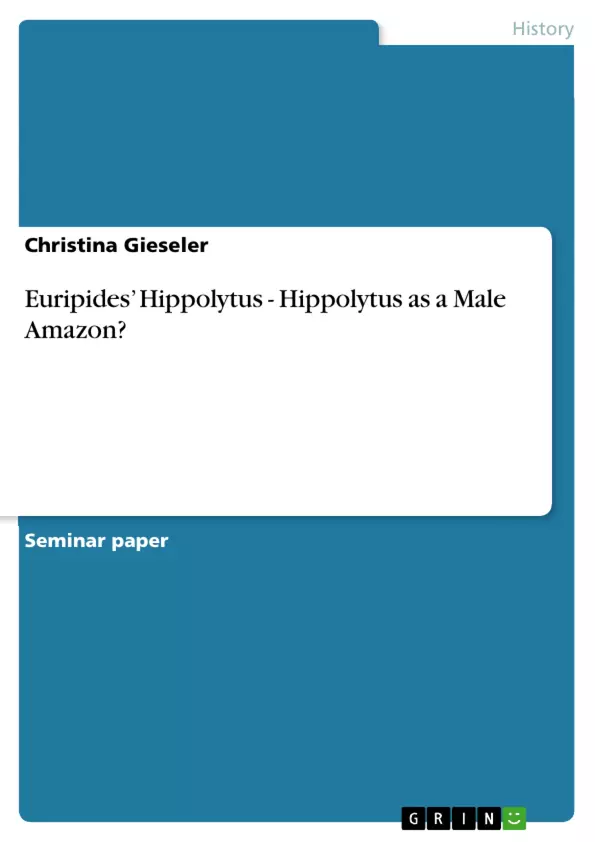Euripides’ Hippolytus is the play has been generally acknowledged to be one of Euripides’ finest [works], both for his skilled reworking of a traditional myth, and for the richness and complexity of its thought and language” (Mills, Euripides 7).
The play offers space for various interpretations and especially the character Hippolytus is argued to appear as rather strange, and less clear than e.g. the character Phaedra (cf. Mills, Euripides 95).
This paper aims to examine Euripides’ play and find out in how far Hippolytus may function as a male Amazon in the play, and how he therewith provides a negative role model for Athenian
men.1 At first, Apollodorus’ and Euripides’ account of the Hippolytus/Theseus myth will be discussed and then the character Hippolytus will be compared to Amazons such as the Lemnian
women and the women of the Sauromatae. After that it will be shown how Hippolytus'inappropriate behavior does not only seal his own fate, but also affects the other characters’ lives
and leads to the disruption of their oikos. Finally, it will be revealed in how far the Hippolytus in Euripides play might have been a character that teaches Athenian men to stick to their society’s rules.
Table of Contents
- Introduction
- The Hippolytus Myth - Apollodorus and Euripides
- Hippolytus, the Son of the Amazon – Features Resembling Amazons
- Lemnian Women and the Women of the Sauromatae
- Hippolytus' Refusal of Marriage and Citizenhood and Its Consequences: Disruption of the Oikos and Punishment through Aphrodite
- The Meaning of The Myth - Men Must Marry
Objectives and Key Themes
This paper aims to analyze Euripides' play "Hippolytus" and explore the extent to which Hippolytus embodies a male Amazon archetype, thereby serving as a negative role model for Athenian men. The paper examines the traditional myth through Apollodorus' account and compares Hippolytus' character to that of the Lemnian women and the women of the Sauromatae. Furthermore, it explores the consequences of Hippolytus' behavior on himself and other characters, ultimately considering the play's potential message regarding the importance of conformity to Athenian societal norms for men.- Hippolytus as a male Amazon figure
- The influence of Hippolytus' Amazonian mother
- The consequences of Hippolytus' refusal of marriage
- The disruption of the oikos (household) due to Hippolytus' actions
- The play's potential message about conforming to Athenian societal norms
Chapter Summaries
- The introduction provides an overview of Euripides' play "Hippolytus" and its themes, particularly focusing on Hippolytus' potential portrayal as a male Amazon.
- The second chapter compares Apollodorus' account of the myth with Euripides' dramatic rendition, highlighting the play's focus on the household of Theseus and Phaedra in Trozên.
- The third chapter analyzes Hippolytus' character traits and behaviors that connect him to Amazons. It examines how Hippolytus' Amazonian mother influences his upbringing and compares his refusal of marriage to the Lemnian women and their rejection of Aphrodite's cult.
Keywords
This paper focuses on the character of Hippolytus in Euripides' play "Hippolytus," exploring themes of gender, sexuality, and societal norms in the context of Ancient Greece. Key concepts include the Amazon archetype, the role of marriage in Athenian society, the consequences of defying societal expectations, and the disruption of the oikos (household).Frequently Asked Questions
What is the central thesis regarding Hippolytus in this paper?
The paper explores the idea that Hippolytus functions as a "male Amazon," serving as a negative role model for Athenian men.
How does Hippolytus resemble an Amazon?
His refusal of marriage, rejection of Aphrodite's cult, and his connection to his Amazonian mother are key features resembling Amazonian behavior.
What are the consequences of Hippolytus' behavior in the play?
His actions lead to divine punishment from Aphrodite and the eventual disruption and destruction of his father's oikos (household).
Which mythological accounts are compared in this analysis?
The paper compares Apollodorus' traditional account of the myth with Euripides' dramatic adaptation.
What was the intended message for the Athenian audience?
The play likely taught Athenian men the importance of adhering to societal norms, such as marriage and civic duties.
- Citation du texte
- Christina Gieseler (Auteur), 2007, Euripides’ Hippolytus - Hippolytus as a Male Amazon?, Munich, GRIN Verlag, https://www.grin.com/document/148696



